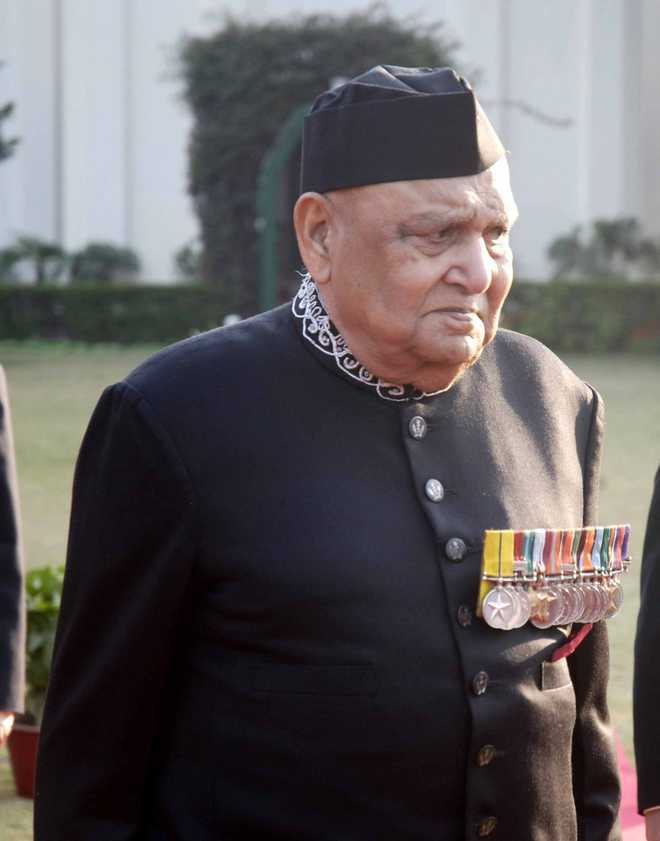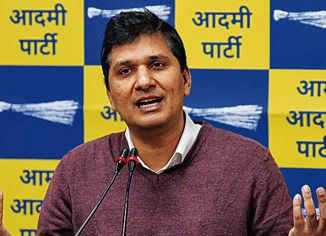
Former J-K Governor Lt Gen S K Sinha. Tribune file photo
Sandeep Dikshit
Lt Gen Sinha was all of 21 and India a two-month-old nation when their destinies intertwined. As a young Major, he was among the first Indian Army officers to land in Srinagar when the momentum was with the Pakistani raiders.
Lt Gen Sinha marshalled the airlift of troops from Delhi. In his words: “We flew in 800 sorties in 15 days. About 5,000 troops with stores and equipments were flown to last the winter. I was shuttling between Delhi and Srinagar, often overstaying nights in Srinagar.”
(Follow The Tribune on Facebook; and Twitter @thetribunechd)
Had the Indian Army, with then Major Sinha as a key participant, not established the air bridge, the entire state would have keeled over to Pakistan. Army officers of that time were cut from a different cloth. Lt Gen Sinha dazzled in his post-Independence tenures and was slated to take over as Chief of the Army Staff. He would have got that coveted post had his truthfulness and candour not come in the way.
The year was 1983 and India’s charismatic though authoritarian Prime Minister Indira Gandhi was planning two misadventures with the Army in the lead role. Indira Gandhi wanted to dispatch a mix of Intelligence and armed force personnel to intervene in Mauritius. The Indian military was divided with Navy Chief Admiral OS Dawson backing the idea. But Lt Gen Sinha, who was the Deputy Army Chief then, said a firm no. The second is part of Punjab’s lore when Lt Gen Sinha counselled Indira Gandhi against storming the Golden Temple. She rejected the advice and Punjab along with parts of India suffered a decade-long trauma as a consequence.
Indira Gandhi found Lt Gen Sinha too contrarian for her taste and decided to supersede him. The soldier quit the job but kept his dignity intact. A statesman was born when he said he did not question the decision of the Government and had chosen to fade away from the Army.
As Lt Gen Sinha kept himself occupied as a columnist and on the lecture circuit, New Delhi realised it would be better off with the former Army officer in the governing arrangement. India-Nepal ties were on the rocks because of a blockade and democratic impulses were on the rise. In that difficult situation in 1989, Lt Gen Sinha was sent to mend the fences. By all accounts, he did well. India and Nepal returned to the negotiating table and democracy began taking roots.
New Delhi then drafted him to help douse the fires of anti-immigrant movement in Assam. As Governor, he was credited with ideating a hearts and minds policy that helped neutralise the sentiments of secession. Once again, Lt Gen Sinha was to give an advice that the Centre was to regret for not taking it on board. He was ridiculed for recommending the scrapping of the Illegal Migration Detection by Tribunal (IMDT) Act, but vindicated several years later when the Supreme Court invalidated the legislation.
The General was then drafted to helm Jammu & Kashmir where the situation was undergoing a metamorphosis after a ceasefire on the Line of Control (LoC). But the complexities of the dispute have proved too much for statesmen of much greater calibre. Lt Gen Sinha tried his best but the Mumbai attack proved to be the final nail.
With his first and last official posts in Independent India centred around J&K, the General gave two more counsels. He felt not allowing the Army to chase the enemy up to Muzaffarabad in 1947 was a strategic blunder. “We lost an important opportunity. If Indian army was allowed to advance beyond Uri, then Muzaffarabad would not have been under control of Pakistan,” he was to comment later. But Lt Gen Sinha was a realist to the core. His personal view after stepping down as Governor of J&K was that both sides should give up on occupying each other’s territory and instead settle for the LoC as the international border.























